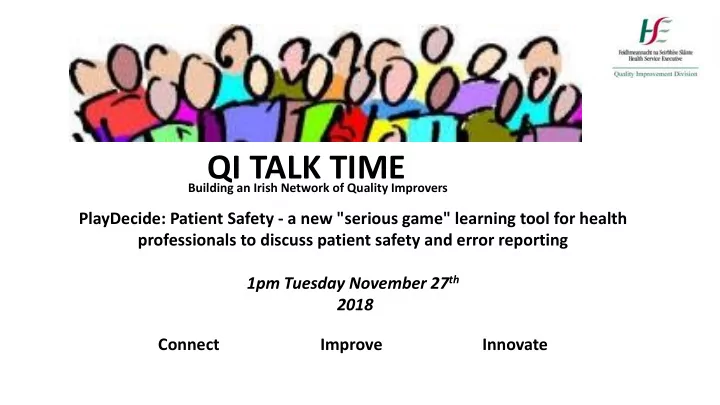

QI TALK TIME Building an Irish Network of Quality Improvers PlayDecide: Patient Safety - a new "serious game" learning tool for health professionals to discuss patient safety and error reporting 1pm Tuesday November 27 th 2018 Connect Improve Innovate
Speakers Steve Mac Donald: a global health researcher and communicator. A member of the UCD Health Systems Team working on dissemination of the PlayDecide: Patient Safety game and research findings, and other projects. In addition he works independently on interventions to reduce self-stigma among people living with TB and HIV in low- and middle-income countries, in collaboration with Irish and international NGO Karen Rotherham-Egan: an independent patient safety representative who has been involved in numerous initiatives in the area of effective healthcare delivery. Over the past four years, she has assisted the Health Systems team at UCD in the development of PlayDecide. She is currently involved in the dissemination of the research findings to encourage system-wide use of PlayDecide as an educational tool. She also delivers patient perspective lectures across numerous health professional education programmes.
In Instructions • Interactive • Sound: Computer or dial in: Telephone no: 01-5260058 Event number: 846 914 224# • Chat box function • Comments/Ideas • Questions • Keep the questions coming • Twitter: @QITalktime
PlayDecide: Patient Safety A “serious game” learning tool to discuss medical professionalism in relation to reporting and patient safety Karen Rotherham-Egan Steve Macdonald Patient Safety Representative Research Scientist
Supporting professionalism and patient safety Building strong safety cultures in healthcare helps patients and staff Blame culture and other barriers can pose a challenge to creation of supportive environments
Current landscape Open disclosure and mandatory open disclosure 1 Patient-related incidents are sometimes unavoidable 2 Errors or incidents may be being under-reported 3 1) Government of Ireland. Patient Safety Bill . Dublin: Government of Ireland; 2018 2) 53,000 incidents at acute hospitals across Ireland in 2014 (State Claims Agency, 2016) 3) Rafter et al., 2016. The Irish National Adverse Events Study (INAES): the frequency and nature of adverse events in Irish hospitals — a retrospective record review study. BMJ Qual Saf. 2017 Feb;26(2):111-119
Reasons for not reporting Fear of retribution Believing someone else is dealing with the problem Thinking that nothing will change after reporting
A new tool PlayDecide: Patient Safety
PlayDecide: Patient Safety Discuss patient safety issues Exchange perspectives Formulate group position
What is PlayDecide: Patient Safety? Educational focus “Serious game” Discussion-based Interdisciplinary exchange
Co-development process
Co-development process (contd.) Synthesis: • Lived experiences of participants 11 key • State Claims Content stakeholders Agency reports created over • National & with diverse international 6 workshops perspectives literature across a 6- • Systems analysis on patient month period of incidents safety • Medical professionalism • The importance of speaking up
First iteration of the game 13 story cards, 22 information cards, 22 issue cards, 4 position statements
Testing the game Top 3 contributory factors to incidents identified by junior doctors 3 Over 100 junior doctors took part in PlayDecide workshops at two hospital sites. Investigating whether the game would be a useful addition to support medical professionalism in relation to patient safety. Examined leadership inclusiveness and psychological safety 1 ; safety concerns based on Medical Council’s eight domains of professional practice 2 ; and semi-structured Reporting rates among junior doctors at the study sites were low – interviews. ~31% of those who had witnessed an incident had reported it. 1) Nembhard and Edmondson. Making it safe: the effects of leader inclusiveness and professional status on psychological safety and improvement efforts in health care teams. J Organ Behav 2006;27:941 – 66 2) Medical Council. Talking about Good Professional Practice, views on what it means to be a good doctor. Dublin: Medical Council; 2014 3) McAuliffe et al. Policy brief on medical professionalism in relation to patient safety . 2017. www.patientsafetydiscussions.ie
PlayDecide session outline Session timing: 50min – 1hr Group size: 4 – 8 (+facilitator) Group 1 2 3 Information Discussion response gathering formulation
How to play 1 Information gathering
How to play 2 Discussion
How to play 2 Discussion (contd)
How to play Group 3 response formulation
How to play Group 3 response formulation (contd)
Content update: 2018 edition Feedback from other testing groups indicated a desire for the game to be revised to include a wider range of perspectives. We sought contributions from other stakeholders, and the game has now been revised to include: • GP • Management • Nursing • Pharmacy • Physiotherapy • More patients • Updates to information and issue cards with recent topics of interest
Benefits of PlayDecide: Patient Safety Engage in open dialogue Interdisciplinary learning Understand MDT perspectives Explore patient safety challenges
Outputs: www.patientsafetydiscussions.ie 2018 MDT edition of PlayDecide: Patient Safety Policy brief on medical professionalism in relation to patient safety Promotional video outlining the game
www.PatientSafetyDiscussions.ie HealthSystems@ucd.ie @UCDHealthSystem
Helpful links Framework for Improving quality www.qualityimprovement.ie Improvement Knowledge and Skills Guide http://www.hse.ie/eng/about/Who/QID/aboutQID/
Follow us on Twitter @QITalktime Missed a webinar – Don’t worry you can watch recorded webinars on HSEQID QITalktime page Next Webinar: Tues 11th Dec 1-2pm: Topic – A guide to HSE QA & I Tool Speaker : Declan O’Keeffe Acute Hospitals Division HSE Thank you from all the team @QITalktime Roisin.breen@hse.ie Noemi.palacios@hse.ie
Recommend
More recommend